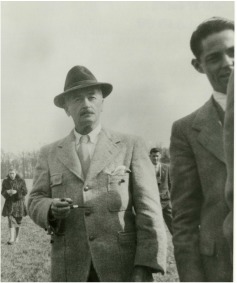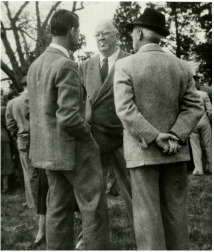FOOTE AND FAULKNER
William Faulkner is widely regarded as one of the most important American authors from the South, and his works have inspired other authors. As a fellow Mississippian and novelist, it is no surprise that Faulkner’s works would deeply influence Shelby Foote, although the manner in which the two would meet – and eventually form a friendship – was unlikely.
Growing up as a frequent guest in Will Percy’s Greenville, Mississippi home, Shelby Foote would be introduced to many well-known authors and poets in the region. One notable exception to the long list of distinguished guests at the Percy house was the famed Faulkner. Foote would eventually learn from his friend Walker Percy the reason for Faulkner’s exile from Greenville. Faulkner had once attended one of Will Percy’s prominent social gatherings in the late 1920s. Arriving barefoot and drunk, Faulkner would go on to make a fool of himself on the tennis court, a game that Percy took seriously. After continuing to disobey Percy’s strict and unspoken rules of behavior, Faulkner found himself banished from any other social functions hosted in Greenville. The incident would also become the reason Will Percy could never refer to Faulkner as a great writer, or have any sort of admiration for his work.[1]
Though unable to meet Faulkner through Will Percy, Foote would nevertheless become enamored with his work. When on a road trip with Walker in 1938, Foote drove the pair to Rowan Oak, Faulkner’s home in Oxford, Mississippi, despite the protests of his friend. Foote and Faulkner would end up speaking for hours on literature and writing. For Foote, the visit marked a pivotal moment in his writing career. Not only did the meeting energize Foote to begin writing his first novel, Tournament, but it also marked the first of many visits between the two. Another such meeting was another road trip, this one to Shiloh in celebration of the publication of Foote’s novel about the battle, which Faulkner praised as “the damndest book I have ever read and one of the best.”[2] Along the way, the pair scoured a dry county together in search of whiskey, which, not surprisingly, they eventually found.[3]
Faulkner’s style was a huge influence on Foote when he was writing his first works of fiction. In fact, one of the biggest criticisms of Foote was that he sounded too much like Faulkner in his early novels.[4] Not only was Foote influenced by Faulkner’s techniques in writing, but also by his views on the South. Like Faulkner, Foote came to view “slavery as America’s… original sin,” as well as seeing flaws in the regions treatment of blacks.[5] Yet Faulkner, like Foote, could never come to grips with just how prevalent prejudice was throughout the South and even in their own works. Though progressive by the standards of the day, neither of them would truly be able to condemn the actions of what both men loved most – the South.
Footnotes
[1] Stuart Chapman, A Writer’s Life (Jackson, MS: University Press of Mississippi, 2003), 40.
[2] Ibid., 138.
[3]Ibid., 73, 147.
[4] Ibid., 196.
[5] John M. McCardell, Jr., “The War in the Southern Mind,” in American Homer (New York: Random House, 2011), 54.

